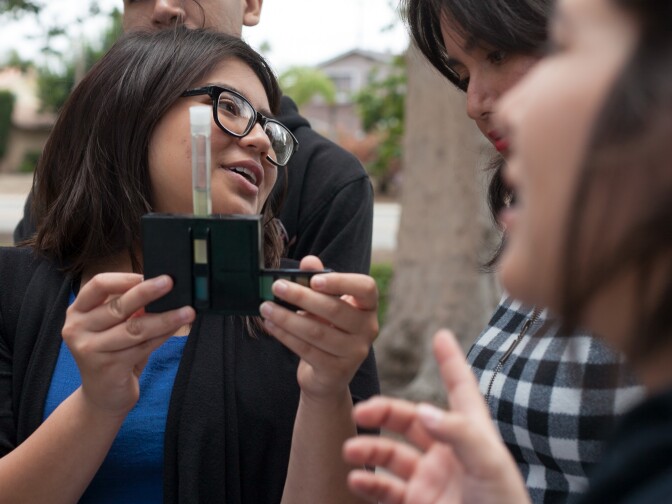This story is free to read because readers choose to support LAist. If you find value in independent local reporting, make a donation to power our newsroom today.
This archival content was originally written for and published on KPCC.org. Keep in mind that links and images may no longer work — and references may be outdated.
Parents, students disagree over who's doing better at saving water
If you grew up in California, all of the drought headlines of late may sound a bit like old news.
After all, three major droughts have beset the state over the past 100 years.
The first was the Dust Bowl, starting in the late 1920s and running through the 1930s. Then came the drought of the late 1970s, which kicked off major water conservation efforts in the state. And more recently, a dry spell that spanned from about 1987 to 1993.
RELATED: 5 ways to teach kids about the California drought
All of this means that Californians have been learning about droughts for a long time. And it suggests that parents are better at saving water than their kids, right? Not so fast, say some students.
Brea resident Kristiana Kubasek remembers first learning about droughts in the first grade, thanks in part to Ricki the Raindrop, a cartoon character that dates back about 40 years and is just one in a series of characters used by the government to encourage water savings.
"The Orange County municipal water district used Ricki to teach kids about the water cycle and how important it was to conserve," Kubasek recalls.
Now, Kubasek has twins in the fourth grade who are learning about the drought. She said it has become a frequent topic of conversation in her home. With history repeating itself, her kids are learning some of the lessons that she picked up while growing up.
Here's one you probably learned: if it's yellow, let it mellow; if it's brown, flush it down.
High school science teacher Jill Lytle thinks about the lessons she learned, too. She grew up in Orange County and graduated from high school in 1991.
“Most of us, if we look back at junior high and high school and think about the classes we took, we have forgotten most of the facts that we were taught,” she said. “It’s important to me to try and teach them about the world that they live in because maybe those are lessons they can take with them.”
As the state's worst drought on record takes hold, there's a sense of urgency for everyone to save water. But ask parents, and some will say they are doing better at conservation than their kids.
"I think about it every day," said Leigh Smyth, a Pasadena parent. "I started capturing my shower water in the morning as it's warming up." She says her oldest teenager is the biggest water waster in her home.
Some students see the debate differently, and argue it's their parents who need a refresher in conservation.
Lessons in the field
A creek bed runs alongside Godinez Fundamental High School in Santa Ana where Lytle teaches. During a recent visit there, about 20 Advanced Placement environmental science students had the task of testing the water.
But the level in the creek was so low that even filling a pitcher with water was a struggle for the students.
“You can barely get it at all from the amount that’s left,” said high school senior Joel Vergara. He says the water levels are much lower than when his class last visited in November.
Then there’s the smell: student Tiona Jones says that’s gotten worse, too.
“It smells, like, disgusting. It's like old rotten trash that’s just been sitting there for days,” she said.
Dyana Pena with Orange County Coastkeeper, a nonprofit that focuses on water protection, explains that the stench is a sign of the drought.
“The rotten egg smell or the sulfur smell usually comes from decaying matter or decomposing matter. It's one of the gases that's released by the bacteria," she said.
As their classmates work, high school seniors Natalie Martinez and Erick Jimenez talk about what they are learning and how they are applying the lessons at home.
They both say they care deeply about the environment and have spent time trying to get their parents to care as well.
“He would leave the hose on and I would just bug him, I'm like, ‘Dad, you're in a drought, you're wasting water, don't do it,’” Natalie said.
Both students say working in the creek has changed how they think about water. They want to help because they believe the state is experiencing a drought the likes of which it hasn't seen before.
"I would say that our generation is kind of more aware about things," Erick said.
When the test results come in, Lytle doesn’t have good news.
"We just aren't finding that much living in here today. So that's not good. And partly it's because the water level is so low. There isn't a lot of space for living things to survive," she said.
Lytle says to change things, students need hands-on lessons like this. When kids touch, feel and smell the water problems, they take the issue seriously and can help be part of the solution.
They might even bring their parents along.
So who's better at saving water -- parents or kids? Add your thoughts in the comments below.















